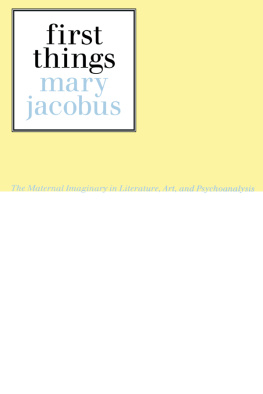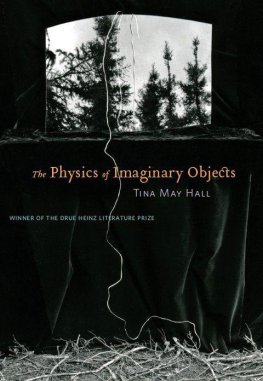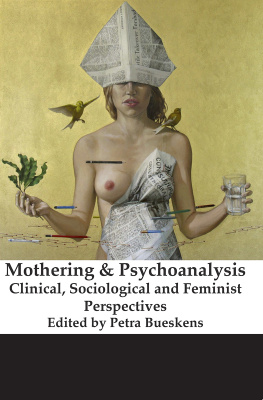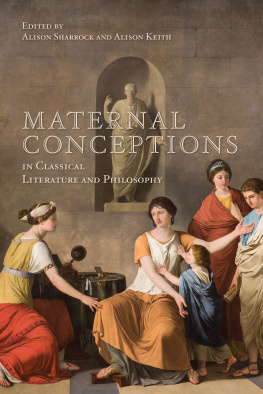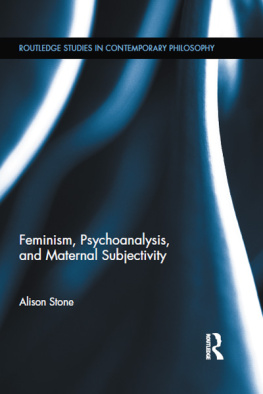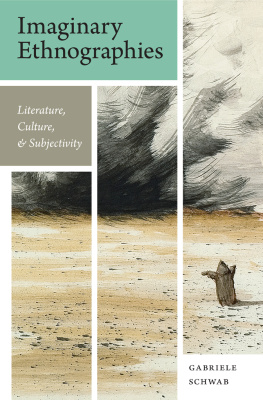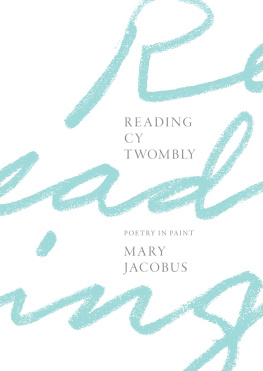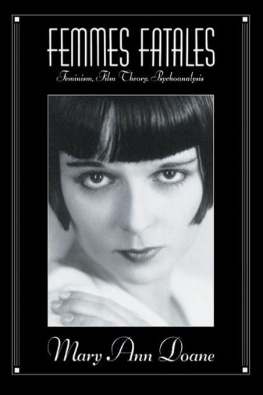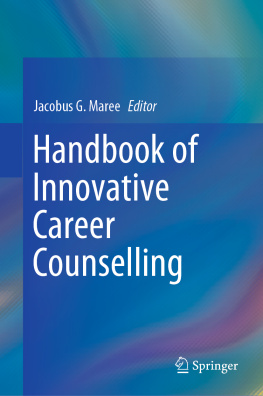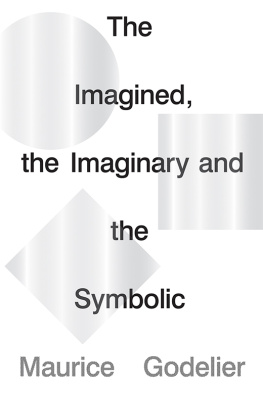Published in 1995 by
Routledge
29 West 35th Street
New York, NY 10001
Published in Great Britain by
Routledge
11 New Fetter Lane
London, EC4P 4EE
Copyright 1995 by Routledge
All rights reserved. No part of this book may be reprinted or reproduced or utilized in any form or by any electronic, mechanical, or other means, now known or hereafter invented, including photocopying and recording or in any information storage or retrieval system, without permission in writing from the publishers.
Library of Congress Cataloging-in-Publication Data
Jacobus, Mary.
First Things: The Maternal Imaginary in Literature,
Art, and Psychoanalysis / Mary Jacobus.
p. cm.
Includes bibliographical references and index.
ISBN 041590383-1.ISBN 041590384X (pbk.)
1. Psychoanalysis and literature. 2. Pyschoanalysis and art. 3. Psychoanalysis and feminism. 4. Femininity (Psychology) 5. Women and psychoanalysis. 6. Mothers in Literature. 7. Myth in literature. 8. Mothers in Art. I. Title
PN56.P92J33 1995
809 .93353dc20 9517589
CIP
For my children, Frances and Josiah, and in memory of my mother, Diana Longstaff Jacobus, with love
I am grateful to the Society for the Humanities at Cornell University for a Faculty Fellowship during 198687, when this book began to take shape, and to the Guggenheim Foundation for the award of a Guggenheim Fellowship during 198889 which allowed me to begin work in earnest. Three chapters, Malthus, Matricide, and the Marquis de Sade, Replacing the Race of Mothers: AIDS and The Last Man, and Portrait of the Artist as a Young Dog, were originally written as the Alexander Lectures, and delivered, along with Cos of the Horse: The Origin of Questions, under the umbrella title of First Things at the University of Toronto in the autumn of 1991. I am grateful for the opportunity to have shared them with a Canadian audience. I am also grateful to the President and Fellows of St. Johns College, Cambridge, for an appointment as Visiting Scholar during 1993, which provided me with valuable time in which to complete this book. A brief stay as guest professor at the Center for Feminist Research and Gender Studies, University of Aarhus, Denmark, in fall 1992, occasioned the writing of In Love with a Cold Climate: Travelling with Wollstonecraft for a Scandinavian audience.
A number of essays included in this book have appeared elsewhere: Freuds Mnemonic: Screen Memories and Feminist Nostalgia, was first published as part of a special issue on women and memory in Michigan Quarterly Review 26 (Winter 1987), and some of the Freud material in The Third Stroke: Reading Woolf with Freud, in Grafts: Feminist Cultural Criticism, edited by Susan Sheridan (London and New York: Verso, 1988); In Parenthesis: Immaculate Conceptions and Feminine Desire, in Body/Politics: Women and the Discourses of Science, edited by Mary Jacobus, Evelyn Fox Keller, and Sally Shuttleworth (London and New York: Routledge, 1989); Russian Tactics: Freuds Case of Homosexuality in a Woman in a special issue on Freud in GLQ: A Journal of Lesbian and Gay Studies 2 (1995); Tea Daddy: Poor Mrs. Klein and the Pencil Shavings in a special Klein issue of Women: A Cultural Review 1 (1990); and Incorruptible Milk: Breast-feeding and the French Revolution in Rebel Daughters: Women and the French Revolution, edited by Sarah E. Melzer and Leslie W. Rabine (New York: Oxford University Press, 1991. Copyright 1992 by the University of California Humanities Institute; reprinted by permission of Oxford University Press, Inc.). I am grateful for permission to revise and reprint them here.
I am also grateful for permission to quote from the collection Her Soul beneath the Bone: Womens Poetry on Breast Cancer, edited by Leatrice H. Lifshitz (Urbana and
Chicago: University of Illinois Press, 1988) and to quote Tess Enroths Consultation in full. This material, 1988 by the Board of Trustees, is used with the permission of Illinois Press. Finally, I am grateful to Chatto & Windus and the Melanie Klein Tust for permission to reproduce Richards drawings from Melanie Kleins Narrative of a Child Analysis (London: Virago Press, 1989). Copyright The Melanie Klein Trust, 1961.
Among the many friends and colleagues who have contributed directly or indirectly to the writing of this book at different stages, whether by their conversation, by listening, by their comments, or by their support, I would like to mention in particular: Gillian Beer, Rachel Bowlby, Cynthia Chase, Jonathan Culler, Peggy Dieter, Zillah Eisenstein, Carol Gilligan, Sander Gilman, Sally Greaves, Evelyn Fox Keller, Karen Klitgaard, Daphne Lambert, Dorothy Mermin, Juliet Mitchell, Reeve Parker, Naomi Segal, Elaine Showalter, and Sally Shuttleworth. I owe a special debt to the members of the Cambridge Womens Reading Group (199293) and to participants in Cornell graduate seminars over the past ten years who have helped me to think more clearly and further by their own energy, commitment, and subtlety of mind.
I am grateful to Kathleen Adler and Tamar Garb, and to the Mount Holyoke College Art Museum for assistance in matters concerning Berthe Morisot; to Malcolm Bowie for helping me grapple with the opacity of Mallarms prose; to Margaret Webster at the Cornell Art and Architecture Visual Resources Center; and to Rachel Roze and Katie Louise Thomas for assistance in the final stages of preparing the manuscript. Finally, I would like to thank my editor, William P. Germano, for encouraging (and waiting for) this book, and Christine Cipriani for seeing it through to press.
First Things is dedicated to my children, from whom I have learned much along the way (including how to order my priorities), and whose own inquiries have sometimes influenced mine. I owe a special debt to my daughter, Frances, who wrote about Morisot as a woman Impressionist before I did, and to my son, Josiah, who still sometimes asks me questions. Since First Things are last things too, this book is also dedicated to the memory of my mother, who did not live to see its publication, and who has had more to do with its writing than either she or I will ever know.
___________________________________
Note: The writings of Freud quoted in the text and notes are from The Standard Edition of the Complete Psychological Works of Sigmund Freud, ed. James Strachey, 24 vols. (London: Hogarth Press, 195374), cited as SE, with volume and page number.
The inception of this book coincided with a number of influential books on the body published during the second half of the 1980s.1 I thought of myself then as writing yet another body bookspecifically, a book on literature, psychoanalysis, and the maternal body (rather than, for instance, on the historical, social, or scientific construction of the maternal body). But as time passed, the maternal body came to seem altogether too embodied, too taken-for-granted, and too material an entity for the essays I found myself writing. This is not to say that the body in question turned out to be entirely disembodied or textualized, or immune to the pressures of the times. Contemporary issues and historical events (the debate over surrogate motherhood, AIDS phobia, and breast cancer, the population increase during the eighteenth century, the French Revolution, and World War II) kept returning me to the effects of texts and ideologies on actual bodies. But my real subject is what I have called the maternal imaginarya portmanteau phrase sufficiently capacious to contain Freuds writing on screen memory, Mary Shelleys futuristic plague novel, Kleins analytic work with children, or Berthe Morisots Impressionism.


